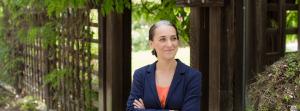Wendy Goldberg awarded Dean's Honoree Award for School of Social Ecology
April 2017
Wendy Goldberg, associate dean for academic programs and professor in the Department of Psychology and Social Behavior, was chosen as the Dean's Honoree Award for the School of Social Ecology.
Goldberg's research focuses on child development and the family context of children with autism and neurotypical children. She also studies work and family issues for young and middle-aged adults.









